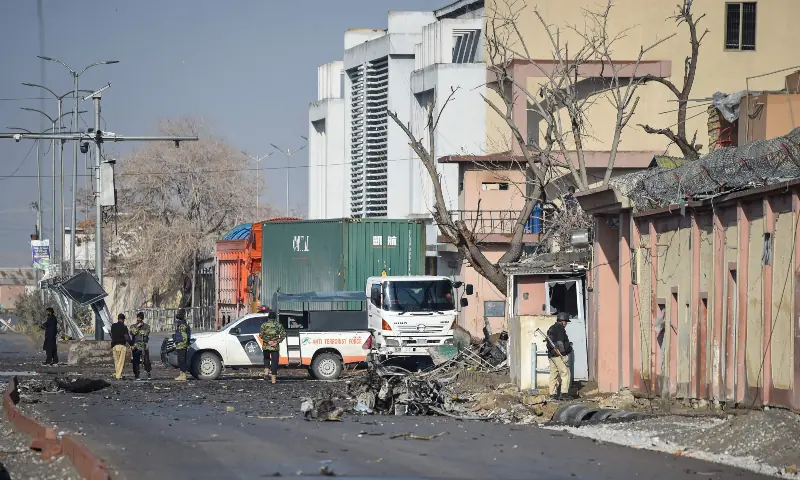February 21, 2025: Islamabad: – Taliban Justice Minister Abdul Hakim Haqqani has resigned, citing widespread corruption and systematic obstruction within the regime. In a leaked audio recording, Haqqani accused Taliban officials of being “thieves, traitors, and corrupt,” exposing deep-seated mismanagement within the group’s leadership. Though his resignation has not been formally accepted, he has declared that he will no longer report to work. Reports suggest that he has left Afghanistan and is currently in Dubai.
Haqqani’s departure comes amid a wave of senior Taliban officials traveling abroad, fueling speculation about internal discord. Deputy Foreign Minister Abbas Stanikzai is reported to have fled to the UAE after openly criticizing Supreme Leader Hibatullah Akhundzada’s restrictive policies, particularly regarding Afghan women’s rights. Meanwhile, Interior Minister Sirajuddin Haqqani, who was last seen 37 days ago during a meeting with Saudi Arabia’s ambassador in Kabul, remains absent from public view. Unverified reports suggest he recently returned to Khost from the UAE on a private flight.
Mullah Abdul Ghani Baradar, the Taliban’s deputy prime minister for economic affairs, also traveled to Doha for medical treatment with a temporary UN-approved travel exemption. However, he unexpectedly appeared at an event in Kabul on Thursday, inaugurating a healthcare center at Daoud Khan Hospital. His presence suggests he may have cut his trip short in an effort to reinforce the Taliban’s unity narrative.
Taliban Leaders Deny Internal Divisions
Despite mounting reports of internal strife, key Taliban figures have publicly denied any fractures within the group’s leadership. Army Chief Fasihuddin Fitrat dismissed claims of internal rifts, calling them “rumors spread by our opponents.” Baradar also attempted to downplay tensions, stating, “Obedience and respect are fundamental principles in the Islamic Emirate and will continue under any circumstances.”
Defense Minister Mullah Yaqub, absent from public events since January 25, also reemerged at the inauguration, reiterating the Taliban’s commitment to governance and international engagement.
Analysts suggest that the highly publicized attendance of senior Taliban figures at the Kabul event was a calculated move to counter growing concerns over defections and leadership disputes. Reports indicate that security threats and dissatisfaction with Akhundzada’s autocratic rule have led to increasing fractures, with several top officials either fleeing or distancing themselves from the regime.
Power Struggles and Policy Discontent
The UK-based Telegraph recently reported that Akhundzada is at odds with key figures such as Sirajuddin Haqqani, Mullah Yaqub, and Abbas Stanikzai over policies restricting women’s education and employment. These disagreements have fueled speculation about possible leadership struggles within the Taliban.
The justice minister’s resignation further amplifies concerns over governance failures. While the Taliban claims to have eradicated corruption, Haqqani’s statements indicate that bribery, nepotism, and mismanagement remain entrenched within the regime. His departure follows reports that the Taliban leader initially attempted to prevent Stanikzai from leaving Afghanistan, even issuing an arrest warrant before he managed to escape.
Meanwhile, opposition figures gathered in Vienna recently to discuss alternative governance structures for Afghanistan. In response, Fitrat dismissed the notion of a post-Taliban Afghanistan as a “delusion” and claimed that the group had ensured security and eliminated discrimination.
Also See: Taliban Impose Travel Ban on Over 8,000 Former Government Officials
A Regime in Crisis?
With an increasing number of Taliban leaders relocating abroad, coupled with public condemnations from within, the group’s grip on power appears increasingly fragile. Haqqani’s resignation is not just a bureaucratic reshuffle—it is a damning indictment of Taliban rule from one of its own senior figures. His allegations of corruption and misrule reinforce long-standing concerns that the Taliban’s governance is built on coercion and personal gain rather than genuine stability.
As economic hardship deepens and Afghanistan faces growing international isolation, the Taliban’s internal discord signals an uncertain future. Whether these tensions lead to an internal coup or further defection remains to be seen, but for now, the cracks in the regime’s facade are becoming increasingly difficult to conceal.
This news is sourced from Afghanistan International and RASC News and is intended for informational purposes only.

![Taliban Justice Minister resigns, citing corruption, as top officials flee, exposing leadership struggles within the regime. [Image via RASC News]](https://southasiatimes.org/wp-content/uploads/2025/02/image_2025-02-19_21-16-01-860x516-1.webp)




